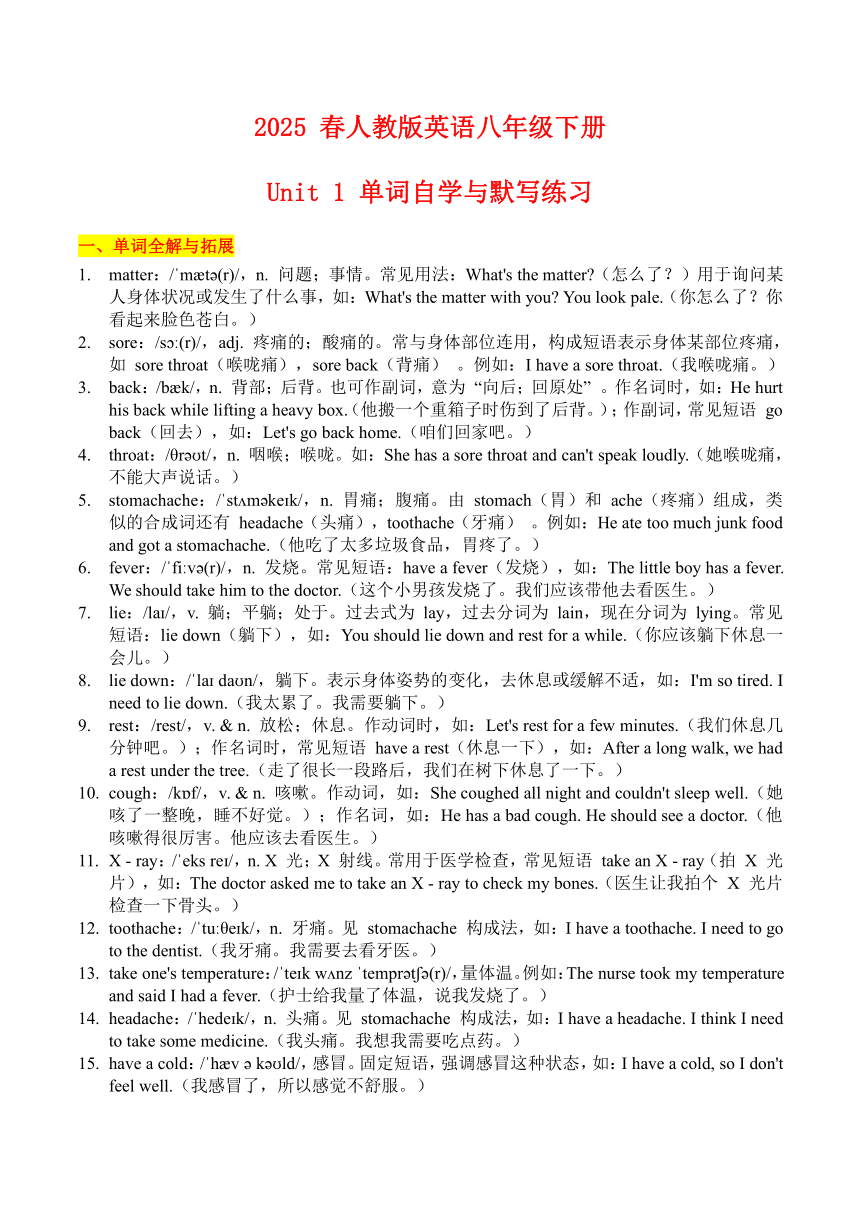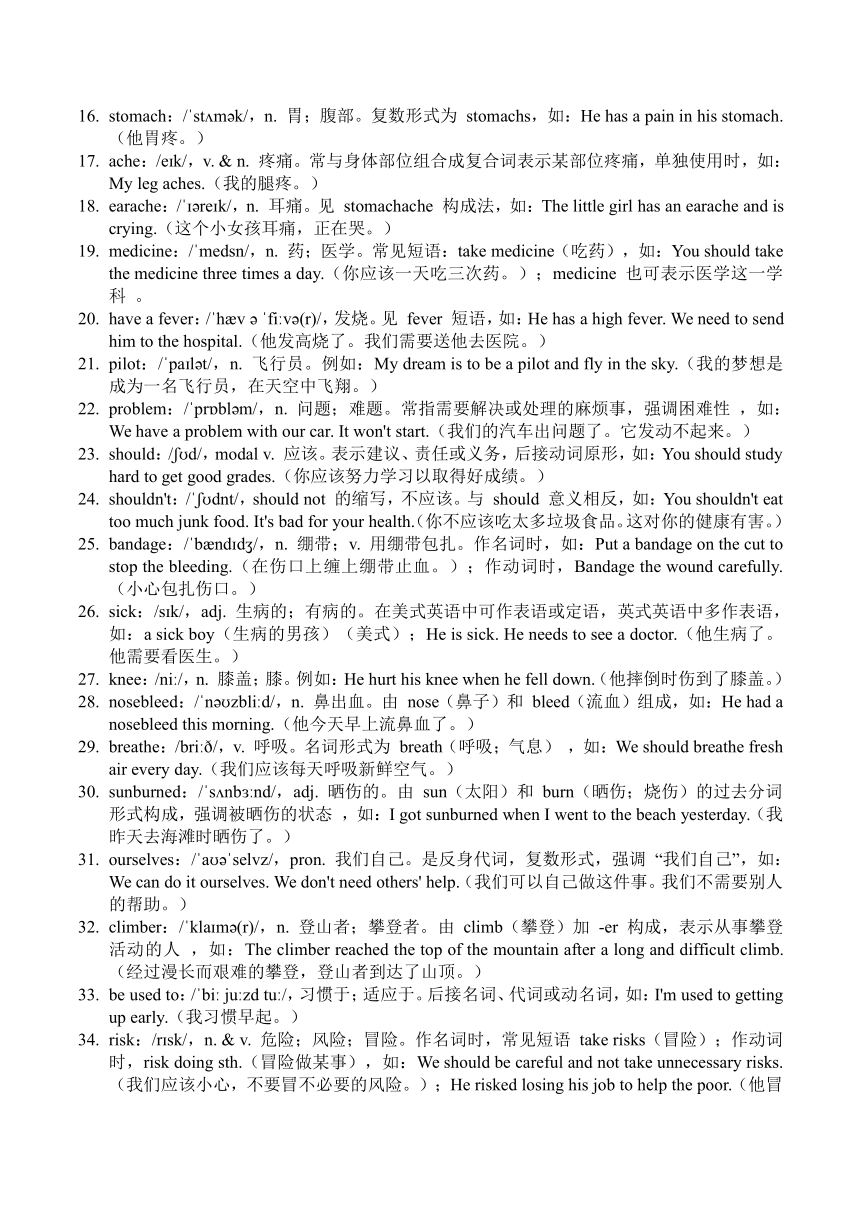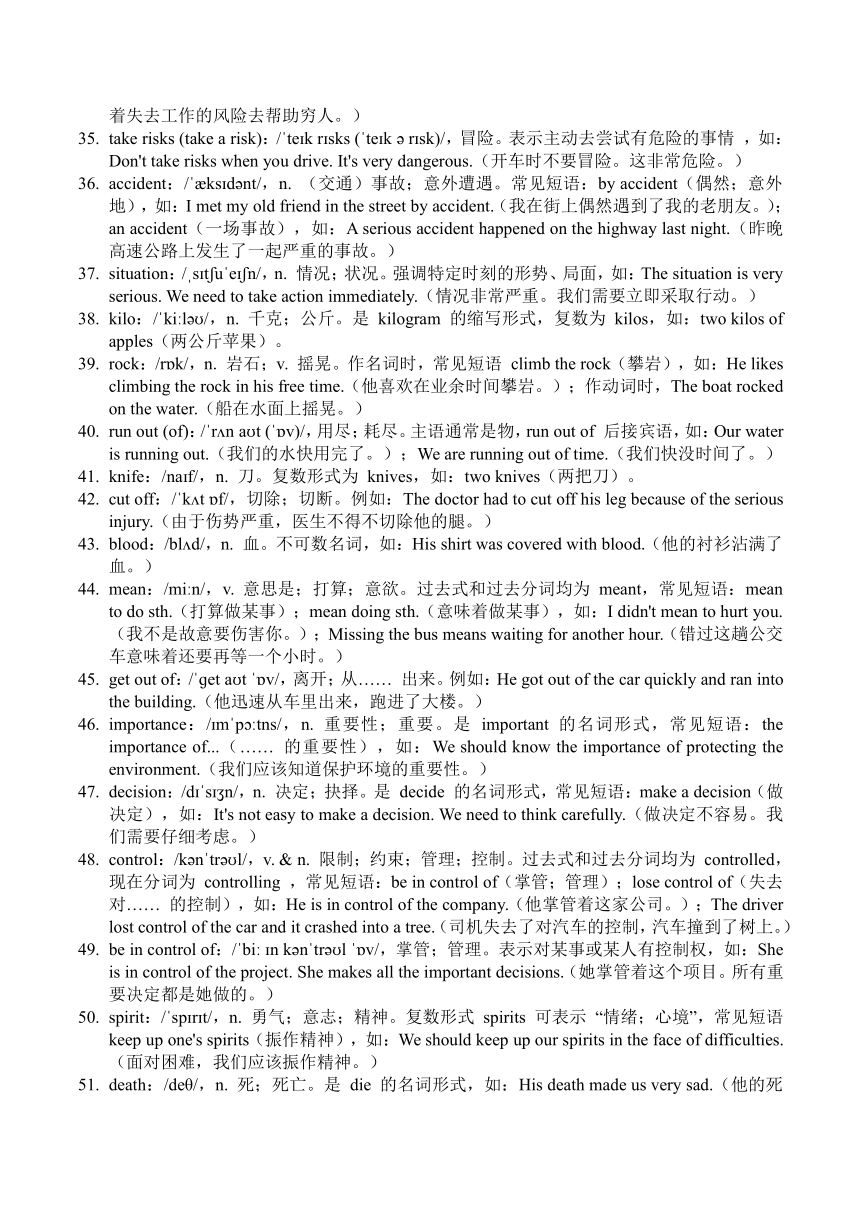【寒假自学】Unit 1 What's the matter?单词自学与默写练习(含答案)2024-2025学年人教版英语八年级下册
文档属性
| 名称 | 【寒假自学】Unit 1 What's the matter?单词自学与默写练习(含答案)2024-2025学年人教版英语八年级下册 |  | |
| 格式 | docx | ||
| 文件大小 | 31.4KB | ||
| 资源类型 | 教案 | ||
| 版本资源 | 人教新目标(Go for it)版 | ||
| 科目 | 英语 | ||
| 更新时间 | 2025-01-27 14:21:28 | ||
图片预览



文档简介
2025 春人教版英语八年级下册
Unit 1 单词自学与默写练习
一、单词全解与拓展
matter:/ m t (r)/,n. 问题;事情。常见用法:What's the matter (怎么了?)用于询问某人身体状况或发生了什么事,如:What's the matter with you You look pale.(你怎么了?你看起来脸色苍白。)
sore:/s (r)/,adj. 疼痛的;酸痛的。常与身体部位连用,构成短语表示身体某部位疼痛,如 sore throat(喉咙痛),sore back(背痛) 。例如:I have a sore throat.(我喉咙痛。)
back:/b k/,n. 背部;后背。也可作副词,意为 “向后;回原处” 。作名词时,如:He hurt his back while lifting a heavy box.(他搬一个重箱子时伤到了后背。);作副词,常见短语 go back(回去),如:Let's go back home.(咱们回家吧。)
throat:/θr t/,n. 咽喉;喉咙。如:She has a sore throat and can't speak loudly.(她喉咙痛,不能大声说话。)
stomachache:/ st m ke k/,n. 胃痛;腹痛。由 stomach(胃)和 ache(疼痛)组成,类似的合成词还有 headache(头痛),toothache(牙痛) 。例如:He ate too much junk food and got a stomachache.(他吃了太多垃圾食品,胃疼了。)
fever:/ fi v (r)/,n. 发烧。常见短语:have a fever(发烧),如:The little boy has a fever. We should take him to the doctor.(这个小男孩发烧了。我们应该带他去看医生。)
lie:/la /,v. 躺;平躺;处于。过去式为 lay,过去分词为 lain,现在分词为 lying。常见短语:lie down(躺下),如:You should lie down and rest for a while.(你应该躺下休息一会儿。)
lie down:/ la da n/,躺下。表示身体姿势的变化,去休息或缓解不适,如:I'm so tired. I need to lie down.(我太累了。我需要躺下。)
rest:/rest/,v. & n. 放松;休息。作动词时,如:Let's rest for a few minutes.(我们休息几分钟吧。);作名词时,常见短语 have a rest(休息一下),如:After a long walk, we had a rest under the tree.(走了很长一段路后,我们在树下休息了一下。)
cough:/k f/,v. & n. 咳嗽。作动词,如:She coughed all night and couldn't sleep well.(她咳了一整晚,睡不好觉。);作名词,如:He has a bad cough. He should see a doctor.(他咳嗽得很厉害。他应该去看医生。)
X - ray:/ eks re /,n. X 光;X 射线。常用于医学检查,常见短语 take an X - ray(拍 X 光片),如:The doctor asked me to take an X - ray to check my bones.(医生让我拍个 X 光片检查一下骨头。)
toothache:/ tu θe k/,n. 牙痛。见 stomachache 构成法,如:I have a toothache. I need to go to the dentist.(我牙痛。我需要去看牙医。)
take one's temperature:/ te k w nz tempr t (r)/,量体温。例如:The nurse took my temperature and said I had a fever.(护士给我量了体温,说我发烧了。)
headache:/ hede k/,n. 头痛。见 stomachache 构成法,如:I have a headache. I think I need to take some medicine.(我头痛。我想我需要吃点药。)
have a cold:/ h v k ld/,感冒。固定短语,强调感冒这种状态,如:I have a cold, so I don't feel well.(我感冒了,所以感觉不舒服。)
stomach:/ st m k/,n. 胃;腹部。复数形式为 stomachs,如:He has a pain in his stomach.(他胃疼。)
ache:/e k/,v. & n. 疼痛。常与身体部位组合成复合词表示某部位疼痛,单独使用时,如:My leg aches.(我的腿疼。)
earache:/ re k/,n. 耳痛。见 stomachache 构成法,如:The little girl has an earache and is crying.(这个小女孩耳痛,正在哭。)
medicine:/ medsn/,n. 药;医学。常见短语:take medicine(吃药),如:You should take the medicine three times a day.(你应该一天吃三次药。);medicine 也可表示医学这一学科 。
have a fever:/ h v fi v (r)/,发烧。见 fever 短语,如:He has a high fever. We need to send him to the hospital.(他发高烧了。我们需要送他去医院。)
pilot:/ pa l t/,n. 飞行员。例如:My dream is to be a pilot and fly in the sky.(我的梦想是成为一名飞行员,在天空中飞翔。)
problem:/ pr bl m/,n. 问题;难题。常指需要解决或处理的麻烦事,强调困难性 ,如:We have a problem with our car. It won't start.(我们的汽车出问题了。它发动不起来。)
should:/ d/,modal v. 应该。表示建议、责任或义务,后接动词原形,如:You should study hard to get good grades.(你应该努力学习以取得好成绩。)
shouldn't:/ dnt/,should not 的缩写,不应该。与 should 意义相反,如:You shouldn't eat too much junk food. It's bad for your health.(你不应该吃太多垃圾食品。这对你的健康有害。)
bandage:/ b nd d /,n. 绷带;v. 用绷带包扎。作名词时,如:Put a bandage on the cut to stop the bleeding.(在伤口上缠上绷带止血。);作动词时,Bandage the wound carefully.(小心包扎伤口。)
sick:/s k/,adj. 生病的;有病的。在美式英语中可作表语或定语,英式英语中多作表语,如:a sick boy(生病的男孩)(美式);He is sick. He needs to see a doctor.(他生病了。他需要看医生。)
knee:/ni /,n. 膝盖;膝。例如:He hurt his knee when he fell down.(他摔倒时伤到了膝盖。)
nosebleed:/ n zbli d/,n. 鼻出血。由 nose(鼻子)和 bleed(流血)组成,如:He had a nosebleed this morning.(他今天早上流鼻血了。)
breathe:/bri /,v. 呼吸。名词形式为 breath(呼吸;气息) ,如:We should breathe fresh air every day.(我们应该每天呼吸新鲜空气。)
sunburned:/ s nb nd/,adj. 晒伤的。由 sun(太阳)和 burn(晒伤;烧伤)的过去分词形式构成,强调被晒伤的状态 ,如:I got sunburned when I went to the beach yesterday.(我昨天去海滩时晒伤了。)
ourselves:/ a selvz/,pron. 我们自己。是反身代词,复数形式,强调 “我们自己”,如:We can do it ourselves. We don't need others' help.(我们可以自己做这件事。我们不需要别人的帮助。)
climber:/ kla m (r)/,n. 登山者;攀登者。由 climb(攀登)加 -er 构成,表示从事攀登活动的人 ,如:The climber reached the top of the mountain after a long and difficult climb.(经过漫长而艰难的攀登,登山者到达了山顶。)
be used to:/ bi ju zd tu /,习惯于;适应于。后接名词、代词或动名词,如:I'm used to getting up early.(我习惯早起。)
risk:/r sk/,n. & v. 危险;风险;冒险。作名词时,常见短语 take risks(冒险);作动词时,risk doing sth.(冒险做某事),如:We should be careful and not take unnecessary risks.(我们应该小心,不要冒不必要的风险。);He risked losing his job to help the poor.(他冒着失去工作的风险去帮助穷人。)
take risks (take a risk):/ te k r sks ( te k r sk)/,冒险。表示主动去尝试有危险的事情 ,如:Don't take risks when you drive. It's very dangerous.(开车时不要冒险。这非常危险。)
accident:/ ks d nt/,n. (交通)事故;意外遭遇。常见短语:by accident(偶然;意外地),如:I met my old friend in the street by accident.(我在街上偶然遇到了我的老朋友。);an accident(一场事故),如:A serious accident happened on the highway last night.(昨晚高速公路上发生了一起严重的事故。)
situation:/ s t u e n/,n. 情况;状况。强调特定时刻的形势、局面,如:The situation is very serious. We need to take action immediately.(情况非常严重。我们需要立即采取行动。)
kilo:/ ki l /,n. 千克;公斤。是 kilogram 的缩写形式,复数为 kilos,如:two kilos of apples(两公斤苹果)。
rock:/r k/,n. 岩石;v. 摇晃。作名词时,常见短语 climb the rock(攀岩),如:He likes climbing the rock in his free time.(他喜欢在业余时间攀岩。);作动词时,The boat rocked on the water.(船在水面上摇晃。)
run out (of):/ r n a t ( v)/,用尽;耗尽。主语通常是物,run out of 后接宾语,如:Our water is running out.(我们的水快用完了。);We are running out of time.(我们快没时间了。)
knife:/na f/,n. 刀。复数形式为 knives,如:two knives(两把刀)。
cut off:/ k t f/,切除;切断。例如:The doctor had to cut off his leg because of the serious injury.(由于伤势严重,医生不得不切除他的腿。)
blood:/bl d/,n. 血。不可数名词,如:His shirt was covered with blood.(他的衬衫沾满了血。)
mean:/mi n/,v. 意思是;打算;意欲。过去式和过去分词均为 meant,常见短语:mean to do sth.(打算做某事);mean doing sth.(意味着做某事),如:I didn't mean to hurt you.(我不是故意要伤害你。);Missing the bus means waiting for another hour.(错过这趟公交车意味着还要再等一个小时。)
get out of:/ ɡet a t v/,离开;从…… 出来。例如:He got out of the car quickly and ran into the building.(他迅速从车里出来,跑进了大楼。)
importance:/ m p tns/,n. 重要性;重要。是 important 的名词形式,常见短语:the importance of...(…… 的重要性),如:We should know the importance of protecting the environment.(我们应该知道保护环境的重要性。)
decision:/d s n/,n. 决定;抉择。是 decide 的名词形式,常见短语:make a decision(做决定),如:It's not easy to make a decision. We need to think carefully.(做决定不容易。我们需要仔细考虑。)
control:/k n tr l/,v. & n. 限制;约束;管理;控制。过去式和过去分词均为 controlled,现在分词为 controlling ,常见短语:be in control of(掌管;管理);lose control of(失去对…… 的控制),如:He is in control of the company.(他掌管着这家公司。);The driver lost control of the car and it crashed into a tree.(司机失去了对汽车的控制,汽车撞到了树上。)
be in control of:/ bi n k n tr l v/,掌管;管理。表示对某事或某人有控制权,如:She is in control of the project. She makes all the important decisions.(她掌管着这个项目。所有重要决定都是她做的。)
spirit:/ sp r t/,n. 勇气;意志;精神。复数形式 spirits 可表示 “情绪;心境”,常见短语 keep up one's spirits(振作精神),如:We should keep up our spirits in the face of difficulties.(面对困难,我们应该振作精神。)
death:/deθ/,n. 死;死亡。是 die 的名词形式,如:His death made us very sad.(他的死让我们非常难过。)
give up:/ ɡ v p/,放弃。后接名词、代词或动名词,如:Don't give up your dream. Keep working hard.(不要放弃你的梦想。继续努力。);He gave up smoking last year.(他去年戒烟了。)
二、重点短语聚焦
What's the matter :用于询问对方身体状况或发生了什么事情,相当于 What's wrong 或 What's the trouble 例如:What's the matter with your sister She looks unhappy.(你妹妹怎么了?她看起来不开心。)
have a + 疾病名称:表示患某种疾病,如 have a headache(头痛),have a cough(咳嗽),have a fever(发烧)等。这种结构是描述身体不适的常见表达方式 ,如:He has a toothache. He needs to see a dentist.(他牙痛。他需要去看牙医。)
lie down and rest:躺下休息,是缓解身体疲劳或不适的一种方式。常用于医生给病人的建议或人们自我调整时的行为描述 ,如:After a long day at work, I just want to lie down and rest.(工作了一整天后,我只想躺下休息。)
take one's temperature:量体温,是医疗检查中的一个基本操作。在描述身体不适就医时或自我监测健康状况时会用到 ,如:The doctor took my temperature to see if I had a fever.(医生给我量体温,看我是否发烧了。)
should / shouldn't do sth.:should 表示应该做某事,用于提出建议;shouldn't 表示不应该做某事,是 should 的否定形式 。例如:You should drink more water to keep healthy.(你应该多喝水来保持健康。);You shouldn't stay up late. It's bad for your health.(你不应该熬夜。这对你的健康有害。)
be used to (doing) sth.:习惯于(做)某事,强调逐渐适应某种情况或行为。这个短语体现了人们在生活中对新环境、新习惯的适应过程 ,如:My grandfather is used to getting up early. He always wakes up at 6:00 am.(我爷爷习惯早起。他总是早上 6 点起床。)
take risks (take a risk):冒险,体现了主动去尝试可能有危险或不确定结果的行为 。常用于描述勇敢面对挑战或不顾危险行事的场景,如:Many young people like to take risks. They enjoy exciting activities.(许多年轻人喜欢冒险。他们喜欢刺激的活动。)
run out (of):用尽;耗尽,描述资源、物品等逐渐减少直至没有的状态。在描述生活中的各种资源使用情况时会用到 ,如:We are running out of food. We need to go shopping.(我们的食物快用完了。我们需要去购物。)
三、单词短语实战默写
1. 晒伤的:____________________
2. 习惯于;适应于:____________________
3. 危险;风险;冒险(名词):____________________
4. 冒险(短语):____________________
5. (交通)事故;意外遭遇:____________________
6. 情况;状况:____________________
7. 千克;公斤:____________________
8. 岩石:____________________
9. 用尽;耗尽(短语):____________________
10. 刀:____________________
11. 切除;切断(短语):____________________
12. 血:____________________
13. 意思是;打算;意欲:____________________
14. 离开;从……出来(短语):____________________
15. 重要性;重要:____________________
16. 决定;抉择:____________________
17. 限制;约束;管理;控制(动词):____________________
18. 掌管;管理(短语):____________________
19. 勇气;意志;精神:____________________
20. 死;死亡:____________________
21. 放弃(短语):____________________
22. 问题;事情:____________________
23. 疼痛的;酸痛的:____________________
24. 咽喉;喉咙:____________________
25. 胃痛;腹痛:____________________
26. 发烧:____________________
27. 躺;平躺;处于:____________________
28. 躺下(短语):____________________
29. 放松;(动词):____________________
30. 咳嗽(动词;名词):____________________
31. X光;X射线:____________________
32. 牙痛:____________________
33. 量体温(短语):____________________
34. 头痛:____________________
35. 感冒(短语):____________________
36. 胃;腹部:____________________
37. 疼痛(动词;名词):____________________
38. 耳痛:____________________
39. 药;医学:____________________
40. 飞行员:____________________
41. 问题;难题:____________________
42. 应该:____________________
43. 不应该:____________________
44. 绷带;用绷带包扎(名词;动词):____________________
45. 生病的;有病的:____________________
46. 膝盖;膝:____________________
47. 鼻出血:____________________
48. 呼吸(动词):____________________
49. 我们自己:____________________
50. 登山者;攀登者:____________________
参考答案:
1.sunburned;2.be used to;3.risk;4.take risks / take a risk;5.accident;6.situation;7.kilo;8.rock;9.run out (of);10.knife;11.cut off;12.blood;13.mean;14.get out of;15.importance;16.decision;17.control;18.be in control of;19.spirit;20.death;21.give up;22.matter;23.sore;24.throat;25.stomachache;26.fever;27.lie;28.lie down;29.rest;30.cough;31.X - ray;32.toothache;33.take one's temperature;34.headache;35.have a cold;36.stomach;37.ache;38.earache;39.medicine;40.pilot;41.problem;42.should;43.shouldn't;44.bandage;45.sick;46.knee;47.nosebleed;48.breathe;49.ourselves;50.climber
Unit 1 单词自学与默写练习
一、单词全解与拓展
matter:/ m t (r)/,n. 问题;事情。常见用法:What's the matter (怎么了?)用于询问某人身体状况或发生了什么事,如:What's the matter with you You look pale.(你怎么了?你看起来脸色苍白。)
sore:/s (r)/,adj. 疼痛的;酸痛的。常与身体部位连用,构成短语表示身体某部位疼痛,如 sore throat(喉咙痛),sore back(背痛) 。例如:I have a sore throat.(我喉咙痛。)
back:/b k/,n. 背部;后背。也可作副词,意为 “向后;回原处” 。作名词时,如:He hurt his back while lifting a heavy box.(他搬一个重箱子时伤到了后背。);作副词,常见短语 go back(回去),如:Let's go back home.(咱们回家吧。)
throat:/θr t/,n. 咽喉;喉咙。如:She has a sore throat and can't speak loudly.(她喉咙痛,不能大声说话。)
stomachache:/ st m ke k/,n. 胃痛;腹痛。由 stomach(胃)和 ache(疼痛)组成,类似的合成词还有 headache(头痛),toothache(牙痛) 。例如:He ate too much junk food and got a stomachache.(他吃了太多垃圾食品,胃疼了。)
fever:/ fi v (r)/,n. 发烧。常见短语:have a fever(发烧),如:The little boy has a fever. We should take him to the doctor.(这个小男孩发烧了。我们应该带他去看医生。)
lie:/la /,v. 躺;平躺;处于。过去式为 lay,过去分词为 lain,现在分词为 lying。常见短语:lie down(躺下),如:You should lie down and rest for a while.(你应该躺下休息一会儿。)
lie down:/ la da n/,躺下。表示身体姿势的变化,去休息或缓解不适,如:I'm so tired. I need to lie down.(我太累了。我需要躺下。)
rest:/rest/,v. & n. 放松;休息。作动词时,如:Let's rest for a few minutes.(我们休息几分钟吧。);作名词时,常见短语 have a rest(休息一下),如:After a long walk, we had a rest under the tree.(走了很长一段路后,我们在树下休息了一下。)
cough:/k f/,v. & n. 咳嗽。作动词,如:She coughed all night and couldn't sleep well.(她咳了一整晚,睡不好觉。);作名词,如:He has a bad cough. He should see a doctor.(他咳嗽得很厉害。他应该去看医生。)
X - ray:/ eks re /,n. X 光;X 射线。常用于医学检查,常见短语 take an X - ray(拍 X 光片),如:The doctor asked me to take an X - ray to check my bones.(医生让我拍个 X 光片检查一下骨头。)
toothache:/ tu θe k/,n. 牙痛。见 stomachache 构成法,如:I have a toothache. I need to go to the dentist.(我牙痛。我需要去看牙医。)
take one's temperature:/ te k w nz tempr t (r)/,量体温。例如:The nurse took my temperature and said I had a fever.(护士给我量了体温,说我发烧了。)
headache:/ hede k/,n. 头痛。见 stomachache 构成法,如:I have a headache. I think I need to take some medicine.(我头痛。我想我需要吃点药。)
have a cold:/ h v k ld/,感冒。固定短语,强调感冒这种状态,如:I have a cold, so I don't feel well.(我感冒了,所以感觉不舒服。)
stomach:/ st m k/,n. 胃;腹部。复数形式为 stomachs,如:He has a pain in his stomach.(他胃疼。)
ache:/e k/,v. & n. 疼痛。常与身体部位组合成复合词表示某部位疼痛,单独使用时,如:My leg aches.(我的腿疼。)
earache:/ re k/,n. 耳痛。见 stomachache 构成法,如:The little girl has an earache and is crying.(这个小女孩耳痛,正在哭。)
medicine:/ medsn/,n. 药;医学。常见短语:take medicine(吃药),如:You should take the medicine three times a day.(你应该一天吃三次药。);medicine 也可表示医学这一学科 。
have a fever:/ h v fi v (r)/,发烧。见 fever 短语,如:He has a high fever. We need to send him to the hospital.(他发高烧了。我们需要送他去医院。)
pilot:/ pa l t/,n. 飞行员。例如:My dream is to be a pilot and fly in the sky.(我的梦想是成为一名飞行员,在天空中飞翔。)
problem:/ pr bl m/,n. 问题;难题。常指需要解决或处理的麻烦事,强调困难性 ,如:We have a problem with our car. It won't start.(我们的汽车出问题了。它发动不起来。)
should:/ d/,modal v. 应该。表示建议、责任或义务,后接动词原形,如:You should study hard to get good grades.(你应该努力学习以取得好成绩。)
shouldn't:/ dnt/,should not 的缩写,不应该。与 should 意义相反,如:You shouldn't eat too much junk food. It's bad for your health.(你不应该吃太多垃圾食品。这对你的健康有害。)
bandage:/ b nd d /,n. 绷带;v. 用绷带包扎。作名词时,如:Put a bandage on the cut to stop the bleeding.(在伤口上缠上绷带止血。);作动词时,Bandage the wound carefully.(小心包扎伤口。)
sick:/s k/,adj. 生病的;有病的。在美式英语中可作表语或定语,英式英语中多作表语,如:a sick boy(生病的男孩)(美式);He is sick. He needs to see a doctor.(他生病了。他需要看医生。)
knee:/ni /,n. 膝盖;膝。例如:He hurt his knee when he fell down.(他摔倒时伤到了膝盖。)
nosebleed:/ n zbli d/,n. 鼻出血。由 nose(鼻子)和 bleed(流血)组成,如:He had a nosebleed this morning.(他今天早上流鼻血了。)
breathe:/bri /,v. 呼吸。名词形式为 breath(呼吸;气息) ,如:We should breathe fresh air every day.(我们应该每天呼吸新鲜空气。)
sunburned:/ s nb nd/,adj. 晒伤的。由 sun(太阳)和 burn(晒伤;烧伤)的过去分词形式构成,强调被晒伤的状态 ,如:I got sunburned when I went to the beach yesterday.(我昨天去海滩时晒伤了。)
ourselves:/ a selvz/,pron. 我们自己。是反身代词,复数形式,强调 “我们自己”,如:We can do it ourselves. We don't need others' help.(我们可以自己做这件事。我们不需要别人的帮助。)
climber:/ kla m (r)/,n. 登山者;攀登者。由 climb(攀登)加 -er 构成,表示从事攀登活动的人 ,如:The climber reached the top of the mountain after a long and difficult climb.(经过漫长而艰难的攀登,登山者到达了山顶。)
be used to:/ bi ju zd tu /,习惯于;适应于。后接名词、代词或动名词,如:I'm used to getting up early.(我习惯早起。)
risk:/r sk/,n. & v. 危险;风险;冒险。作名词时,常见短语 take risks(冒险);作动词时,risk doing sth.(冒险做某事),如:We should be careful and not take unnecessary risks.(我们应该小心,不要冒不必要的风险。);He risked losing his job to help the poor.(他冒着失去工作的风险去帮助穷人。)
take risks (take a risk):/ te k r sks ( te k r sk)/,冒险。表示主动去尝试有危险的事情 ,如:Don't take risks when you drive. It's very dangerous.(开车时不要冒险。这非常危险。)
accident:/ ks d nt/,n. (交通)事故;意外遭遇。常见短语:by accident(偶然;意外地),如:I met my old friend in the street by accident.(我在街上偶然遇到了我的老朋友。);an accident(一场事故),如:A serious accident happened on the highway last night.(昨晚高速公路上发生了一起严重的事故。)
situation:/ s t u e n/,n. 情况;状况。强调特定时刻的形势、局面,如:The situation is very serious. We need to take action immediately.(情况非常严重。我们需要立即采取行动。)
kilo:/ ki l /,n. 千克;公斤。是 kilogram 的缩写形式,复数为 kilos,如:two kilos of apples(两公斤苹果)。
rock:/r k/,n. 岩石;v. 摇晃。作名词时,常见短语 climb the rock(攀岩),如:He likes climbing the rock in his free time.(他喜欢在业余时间攀岩。);作动词时,The boat rocked on the water.(船在水面上摇晃。)
run out (of):/ r n a t ( v)/,用尽;耗尽。主语通常是物,run out of 后接宾语,如:Our water is running out.(我们的水快用完了。);We are running out of time.(我们快没时间了。)
knife:/na f/,n. 刀。复数形式为 knives,如:two knives(两把刀)。
cut off:/ k t f/,切除;切断。例如:The doctor had to cut off his leg because of the serious injury.(由于伤势严重,医生不得不切除他的腿。)
blood:/bl d/,n. 血。不可数名词,如:His shirt was covered with blood.(他的衬衫沾满了血。)
mean:/mi n/,v. 意思是;打算;意欲。过去式和过去分词均为 meant,常见短语:mean to do sth.(打算做某事);mean doing sth.(意味着做某事),如:I didn't mean to hurt you.(我不是故意要伤害你。);Missing the bus means waiting for another hour.(错过这趟公交车意味着还要再等一个小时。)
get out of:/ ɡet a t v/,离开;从…… 出来。例如:He got out of the car quickly and ran into the building.(他迅速从车里出来,跑进了大楼。)
importance:/ m p tns/,n. 重要性;重要。是 important 的名词形式,常见短语:the importance of...(…… 的重要性),如:We should know the importance of protecting the environment.(我们应该知道保护环境的重要性。)
decision:/d s n/,n. 决定;抉择。是 decide 的名词形式,常见短语:make a decision(做决定),如:It's not easy to make a decision. We need to think carefully.(做决定不容易。我们需要仔细考虑。)
control:/k n tr l/,v. & n. 限制;约束;管理;控制。过去式和过去分词均为 controlled,现在分词为 controlling ,常见短语:be in control of(掌管;管理);lose control of(失去对…… 的控制),如:He is in control of the company.(他掌管着这家公司。);The driver lost control of the car and it crashed into a tree.(司机失去了对汽车的控制,汽车撞到了树上。)
be in control of:/ bi n k n tr l v/,掌管;管理。表示对某事或某人有控制权,如:She is in control of the project. She makes all the important decisions.(她掌管着这个项目。所有重要决定都是她做的。)
spirit:/ sp r t/,n. 勇气;意志;精神。复数形式 spirits 可表示 “情绪;心境”,常见短语 keep up one's spirits(振作精神),如:We should keep up our spirits in the face of difficulties.(面对困难,我们应该振作精神。)
death:/deθ/,n. 死;死亡。是 die 的名词形式,如:His death made us very sad.(他的死让我们非常难过。)
give up:/ ɡ v p/,放弃。后接名词、代词或动名词,如:Don't give up your dream. Keep working hard.(不要放弃你的梦想。继续努力。);He gave up smoking last year.(他去年戒烟了。)
二、重点短语聚焦
What's the matter :用于询问对方身体状况或发生了什么事情,相当于 What's wrong 或 What's the trouble 例如:What's the matter with your sister She looks unhappy.(你妹妹怎么了?她看起来不开心。)
have a + 疾病名称:表示患某种疾病,如 have a headache(头痛),have a cough(咳嗽),have a fever(发烧)等。这种结构是描述身体不适的常见表达方式 ,如:He has a toothache. He needs to see a dentist.(他牙痛。他需要去看牙医。)
lie down and rest:躺下休息,是缓解身体疲劳或不适的一种方式。常用于医生给病人的建议或人们自我调整时的行为描述 ,如:After a long day at work, I just want to lie down and rest.(工作了一整天后,我只想躺下休息。)
take one's temperature:量体温,是医疗检查中的一个基本操作。在描述身体不适就医时或自我监测健康状况时会用到 ,如:The doctor took my temperature to see if I had a fever.(医生给我量体温,看我是否发烧了。)
should / shouldn't do sth.:should 表示应该做某事,用于提出建议;shouldn't 表示不应该做某事,是 should 的否定形式 。例如:You should drink more water to keep healthy.(你应该多喝水来保持健康。);You shouldn't stay up late. It's bad for your health.(你不应该熬夜。这对你的健康有害。)
be used to (doing) sth.:习惯于(做)某事,强调逐渐适应某种情况或行为。这个短语体现了人们在生活中对新环境、新习惯的适应过程 ,如:My grandfather is used to getting up early. He always wakes up at 6:00 am.(我爷爷习惯早起。他总是早上 6 点起床。)
take risks (take a risk):冒险,体现了主动去尝试可能有危险或不确定结果的行为 。常用于描述勇敢面对挑战或不顾危险行事的场景,如:Many young people like to take risks. They enjoy exciting activities.(许多年轻人喜欢冒险。他们喜欢刺激的活动。)
run out (of):用尽;耗尽,描述资源、物品等逐渐减少直至没有的状态。在描述生活中的各种资源使用情况时会用到 ,如:We are running out of food. We need to go shopping.(我们的食物快用完了。我们需要去购物。)
三、单词短语实战默写
1. 晒伤的:____________________
2. 习惯于;适应于:____________________
3. 危险;风险;冒险(名词):____________________
4. 冒险(短语):____________________
5. (交通)事故;意外遭遇:____________________
6. 情况;状况:____________________
7. 千克;公斤:____________________
8. 岩石:____________________
9. 用尽;耗尽(短语):____________________
10. 刀:____________________
11. 切除;切断(短语):____________________
12. 血:____________________
13. 意思是;打算;意欲:____________________
14. 离开;从……出来(短语):____________________
15. 重要性;重要:____________________
16. 决定;抉择:____________________
17. 限制;约束;管理;控制(动词):____________________
18. 掌管;管理(短语):____________________
19. 勇气;意志;精神:____________________
20. 死;死亡:____________________
21. 放弃(短语):____________________
22. 问题;事情:____________________
23. 疼痛的;酸痛的:____________________
24. 咽喉;喉咙:____________________
25. 胃痛;腹痛:____________________
26. 发烧:____________________
27. 躺;平躺;处于:____________________
28. 躺下(短语):____________________
29. 放松;(动词):____________________
30. 咳嗽(动词;名词):____________________
31. X光;X射线:____________________
32. 牙痛:____________________
33. 量体温(短语):____________________
34. 头痛:____________________
35. 感冒(短语):____________________
36. 胃;腹部:____________________
37. 疼痛(动词;名词):____________________
38. 耳痛:____________________
39. 药;医学:____________________
40. 飞行员:____________________
41. 问题;难题:____________________
42. 应该:____________________
43. 不应该:____________________
44. 绷带;用绷带包扎(名词;动词):____________________
45. 生病的;有病的:____________________
46. 膝盖;膝:____________________
47. 鼻出血:____________________
48. 呼吸(动词):____________________
49. 我们自己:____________________
50. 登山者;攀登者:____________________
参考答案:
1.sunburned;2.be used to;3.risk;4.take risks / take a risk;5.accident;6.situation;7.kilo;8.rock;9.run out (of);10.knife;11.cut off;12.blood;13.mean;14.get out of;15.importance;16.decision;17.control;18.be in control of;19.spirit;20.death;21.give up;22.matter;23.sore;24.throat;25.stomachache;26.fever;27.lie;28.lie down;29.rest;30.cough;31.X - ray;32.toothache;33.take one's temperature;34.headache;35.have a cold;36.stomach;37.ache;38.earache;39.medicine;40.pilot;41.problem;42.should;43.shouldn't;44.bandage;45.sick;46.knee;47.nosebleed;48.breathe;49.ourselves;50.climber
同课章节目录
- Unit 1 What's the matter?
- Section A
- Section B
- Unit 2 I'll help to clean up the city parks.
- Section A
- Section B
- Unit 3 Could you please clean your room?
- Section A
- Section B
- Unit 4 Why don't you talk to your parents?
- Section A
- Section B
- Unit 5 What were you doing when the rainstorm came
- Section A
- Section B
- Review of Units 1-5
- Unit 6 An old man tried to move the mountains.
- Section A
- Section B
- Unit 7 What's the highest mountain in the world?
- Section A
- Section B
- Unit 8 Have you read Treasure Island yet?
- Section A
- Section B
- Unit 9 Have you ever been to a museum?
- Section A
- Section B
- Unit 10 I've had this bike for three years.
- Section A
- Section B
